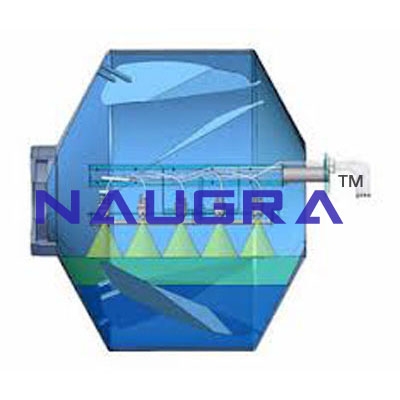- Civil Lab Mechanical Lab Engineering Lab Equipments
- sales@didacticlabequipments.com

CAT NO: DIDACTICNLE-Export-210049
Rolling Agglomeration- Engineering Lab Training Systems.
Technical Description
The terms agglomeration, granulation
and pelletisation designate the process of particle size enlargement of
solids. This trainer was developed in cooperation with theDepartment of
Mechanical Engineering and Process Engineering at the Niederrhein
University of Applied Sciences in Krefeld.
A powder (fine material) is continuously fed onto an inclined, rotating
dish granulator. A pump delivers granulating liquid to a two-component
nozzle. The liquid is atomised over the powder by compressed air.
Starting from a small number of moistened particles, a rolling motion
produces growing numbers of balls (agglomerates). The fine material in
the moved layer tends to remain close to the bottom. It is lifted higher
than the forming agglomerates by the rotary motion of the dish. The
ball-shaped agglomerates roll along the surface of the layer. When they
have attained a certain size, they drop off the rim of the disc. The
agglomerates are collected in a tank. Two further tanks are provided for
the solid material (for which powdered limestone is recommended) and
the granulating liquid (sugar powder diluted in water). The mass flow of
solid feed material, the flow rate of the liquid, the speed and the
angle of inclination of the disc are adjustable. The compressive
strength of the resultant agglomerates can be measured using a
laboratory device or with accessory unit . To determine these and other
key properties of the agglomerates, a balance and drying chamber are
also recommended.
The well-structured instructional
material sets out the fundamentals and provides a step-by-step guide
through the experiments.
